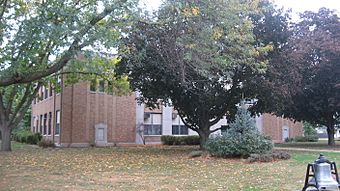Louisa County Courthouse (Iowa) facts for kids
Quick facts for kids |
|
|
Louisa County Courthouse
|
|
 |
|
| Location | Main St. Wapello, Iowa |
|---|---|
| Area | less than one acre |
| Built | 1928 |
| Built by | Zohbon and Lewis |
| Architect | Keiffer, Jones and Thomas |
| Architectural style | Art Deco |
| MPS | County Courthouses in Iowa TR |
| NRHP reference No. | 81000253 |
| Added to NRHP | July 2, 1981 |
The Louisa County Courthouse is a special building in Wapello, Iowa, United States. It was built in 1928 and is where important county government work happens. This building is listed on the National Register of Historic Places. This means it is recognized as an important historical site. It is the fourth building that Louisa County has used for its court and administrative offices.
Contents
A Look Back: The History of the Courthouse
The story of the Louisa County Courthouse begins with how the county seat was chosen. The county seat is the main town where the county government is located. The government of the Wisconsin Territory decided that Middle Wapello would be the county seat. This decision brought together three smaller communities into one town.
The First Courthouses in Louisa County
The very first courthouse was a simple log building. It was privately owned, not built by the county itself. In 1840, the county built its own brick courthouse. This building was about 40 feet long and 22 feet wide. It was also used as a school! The county didn't have enough money to pay for it right away. So, they agreed to pay the builder extra interest on the $1,300 they owed.
A new courthouse was built in Wapello in 1854. This one cost about $9,577.69. At one point, the town of Columbus Junction wanted to be the county seat. They even raised $25,000 and built a two-story brick building. They hoped it would become the new courthouse. But they didn't become the county seat, so their building became a school instead.
The Current Courthouse Building
The courthouse you see today was built in 1928. It stands on the same spot as the 1854 building. This modern courthouse cost around $100,000 to build. It has served the people of Louisa County ever since.
Design and Style: The Courthouse Architecture
The current Louisa County Courthouse is a two-story building. It was designed in a simpler version of the Art Deco style. Art Deco was a popular design style in the 1920s and 1930s. It often featured geometric shapes and sleek lines. The architectural firm of Keiffer, Jones and Thomas from Des Moines designed it. The building was constructed by Zohbon and Lewis, also from Des Moines.
Key Features of the Building
The courthouse is made of light brown bricks. It has stone details that make it look even nicer. The front of the building is symmetrical, meaning both sides are the same. There are parts on each end that stick out a little bit. These parts have special carvings called bas-reliefs. A bas-relief is a type of sculpture where the figures stick out slightly from a flat background. On this courthouse, you can see carvings of eagles made from stone.
The courthouse is important because it represents the county government. It also shows the political power and importance of Wapello as the county seat.
 | Kyle Baker |
 | Joseph Yoakum |
 | Laura Wheeler Waring |
 | Henry Ossawa Tanner |



